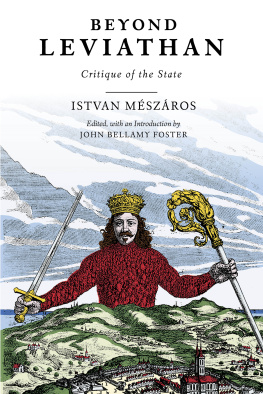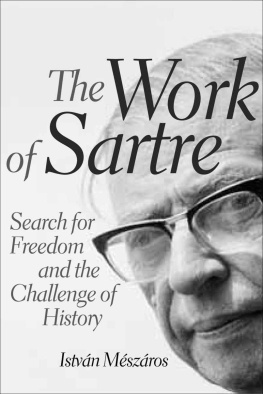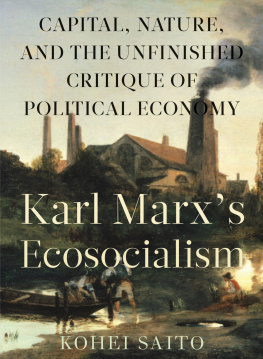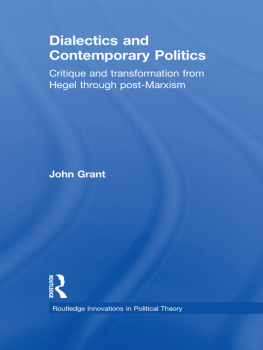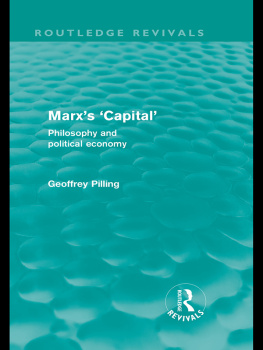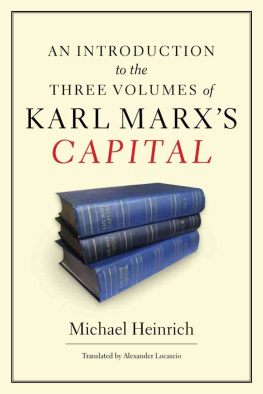The Necessity of Social Control
BY THE SAME AUTHOR
Satire and Reality, Szpirodalmi Knyvkiad, Budapest 1955
La rivolta degli intellettuali in Ungheria, Einaudi 1958
Attila Jzsef e larte moderna, Lerici 1964
Marxs Theory of Alienation, Merlin Press 1970
The Necessity of Social Control, Merlin Press 1971
Aspects of History and Class Consciousness (ed.), Routledge 1971
Lukcss Concept of Dialectic, Merlin Press 1972
Neocolonial Identity and Counter-Consciousness: The Work of
Renato Constantino (ed.), Merlin Press 1978
The Work of Sartre: Search for Freedom, Harvester Wheatsheaf 1979
Philosophy, Ideology and Social Science, Harvester Wheatsheaf 1986
The Power of Ideology, Harvester Wheatsheaf 1989
Beyond Capital: Toward a Theory of Transition, Merlin Press 1995
Lalternativa alla societ del capitale: Socialismo o barbarie, Punto Rosso 2000
Socialism or Barbarism: From the American Century to the Crossroads,
Monthly Review Press, 2001
A educao para alm do capital, Boitempo Editorial 2005
O desafio e o fardo do tempo histrico, Boitempo Editorial 2007
The Challenge and Burden of Historical Time, Monthly Review Press 2008
A crise estrutural do capital, Boitempo Editorial 2009
The Structural Crisis of Capital, Monthly Review Press 2009
Social Structure and Forms of Consciousness:
Vol. 1, The Social Determination of Method, Monthly Review Press 2010
Vol. 2, The Dialectic of Structure and History, Monthly Review Press 2011
The Work of Sartre: Search for Freedom and the Challenge of History,
Monthly Review Press 2012
THE NECESSITY
OF SOCIAL CONTROL
by ISTVN MSZROS

Copyright 2015 by Istvn Mszros
All Rights Reserved
Library of Congress Cataloging-in-Publication Data
Mszros, Istvn, 1930
The necessity of social control / by Istvn Mszros.
pages cm
Includes bibliographical references and index.
ISBN 978-1-58367-538-0 (pbk. : alk. paper) ISBN 978-1-58367-539-7 (cloth : alk. paper) 1. Marxian school of sociology. 2. Socialism. 3. Capitalism. 4. Historical materialism. 5. Marxian economics. 6. SociologyPhilosophy. I. Title.
HM471.M47 2014
301.01dc23
2014031854
Monthly Review Press
146 West 29th Street, Suite 6W
New York, New York 10001
www.monthlyreview.org
Typeset in Arno Pro 10.5/13
5 4 3 2 1
TABLE OF CONTENTS
by John Bellamy Foster
FOR DONATELLA
FOREWORD
by John Bellamy Foster
ISTVN MSZROS IS ONE of the greatest philosophers that the historical materialist tradition has yet produced. His work stands practically alone today in the depth of its analysis of Marxs theory of alienation, the structural crisis of capital, the demise of Soviet-style post-revolutionary societies, and the necessary conditions of the transition to socialism. His dialectical inquiry into social structure and forms of consciousnessa systematic critique of the prevailing forms of thoughtis unequaled in our time. No less a historical figure than Hugo Chvez referred to him as the pathfinder of twenty-first century socialism.
The present book grew out of a conversation that he and I had in July 2013 in London, in which I expressed the need for an easily accessible work that would provide a way into his thinking for the uninitiated. He took this challenge seriously, resulting in the book before you. The role of the present foreword is to help to put his system of thought as a whole, and this book in particular, in their historical contexts, while illuminating some of the distinctive concepts governing his analysis.
Marx, Lukcs, and Mszros
MARXS ECONOMIC AND PHILOSOPHICAL Manuscripts of 1844discovered in the late 1920s but only becoming widely known decades laterwas unquestionably the most widely discussed and influential philosophical work to appear in the twentieth century. For the first time the full philosophical roots of Marxs system became evidentin ways that challenged the whole history of philosophy up to that time, along with the roots of the prevailing social order.discovery of Marxs early writings raised entirely new intellectual challenges for social theory. Among these were comprehending the much deeper relation between the Hegelian and Marxian philosophical traditions that these works made evident.
It was Georg Lukcswhose monumental History and Class Consciousness (1923) had provided the most influential interpretation of the dialectical relation between the Hegelian and Marxian systems, but whose outlook was to be transformed by his subsequent encounter with Marxs early manuscriptswho responded most radically to this challenge, delving deeply into Hegels philosophy, out of which Marxs theory of alienation had emerged. The result was The Young Hegel: Studies in the Relations between Dialectics and Economics (1966).
Hegels idealist philosophy thus took on a more comprehensive form than that of any of his predecessors within German idealism. What Kant had previously characterized as insurmountable antinomies were seen in Hegels philosophy as manifestations of a contradictory historical process, in which the various mediations between the material and ideal, subjective and objective, particular and universal were revealed and supersededbut only at the level of thought. Here the inalienable truths of Enlightenment philosophy were given their ultimate justification: as the unfolding of reason (the absolute spirit) in history.
Marxs theory of alienation represented his rebellion against the Hegelian system. However, in contradistinction to Hegel, he sought to transcend this alienated world, not by providing an idealist reconciliation of subject/object within the realm of thought, but through revolutionary praxis.
As Lukcss assistant and younger colleague (until he departed for the West after the 1956 Soviet invasion of Hungary), Mszros was to continue the exploration of
According to Mszross interpretation of Marxs theory of alienation and its relation to his overall critique of political economy, capital as a system perfects and universalizes what in previous class systems were mere partial tendencies. It seizes upon and alienates humanitys distinctive role as the self-mediating being of nature, turning this essential human relation into a means of class oppression by removing workers from control of the means of production, thus severing their direct connection to nature and their own labor. The result is the growth of social chasms and crises that the logic of the system carries to the nth degree, bringing to the fore at last its own absolute limitations.
It was this overall viewpoint, already present in nascent form in Marxs Theory of Alienation, that led Mszros to his theory of the global structural crisis of capitalreferred to in the preface to the third (1971) edition of his book.that pattern... the ecological resources of our planet would have been exhausted well before the end of that century several times over (27).
Nor could science and technology, Mszros insisted, dispose of capitalisms ecological contradictions, since the fundamental environmental problem stemmed from the logic of capital itself, geared to infinitive quantitative economic expansion, and thus in antagonistic relation to any truly sustainable pattern of development. This critical standpoint was already evident in nascent form in
Next page

